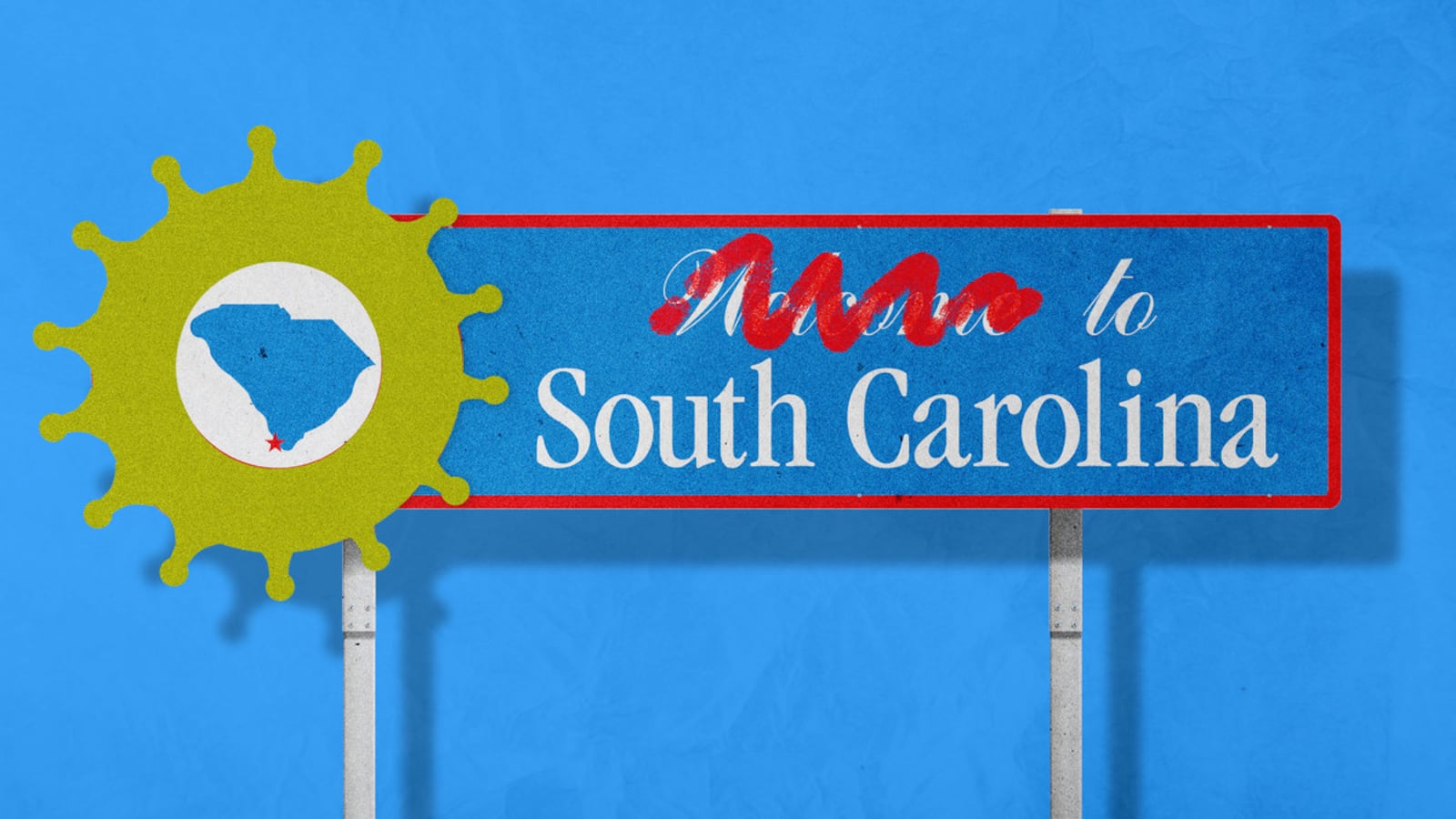Horney Mitchell is scared.
The mayor of the small town of Gifford, South Carolina, sees what’s happening across the state line in Georgia, where the state’s Republican governor is loosening coronavirus restrictions, and his advice to people is simple.
Stay home.
“I'm telling my folks, don't go to Georgia,” Mitchell said. “What I tell them is (to) stay home and stay safe. Do not cross the Georgia line.”
Saying that is difficult, he said, because it’s hard to tell someone how to live their life. He doesn’t want to be a bearer of bad news. He’d rather be one to pass on a positive thought.
But if it helps to save a life, Mitchell doesn’t mind doing it.
“They don’t have a handle on the virus yet,” Mitchell said when asked about the neighboring state. “And we are that close to Georgia, some of our folks will travel there and may retract something back this way. So I'm very scared about that.”
Mitchell, a Democrat, is not alone in his concerns. But the dynamic in Georgia has created a difficult situation for mayors on the South Carolina side of the Georgia border. In interviews, some appeared keen to avoid weighing in on political disputes during a public health crisis. Other local leaders made clear their concerns.
“It is very scary,” said Francenia Ellis, the mayor of Furman, South Carolina, which sits less than 20 miles from the Georgia border and roughly an hour from Savannah. “Because I do believe that we still need to be more cautious about this thing.”
Last week Georgia Gov. Brian Kemp announced that certain businesses could reopen April 24, including gyms, barbers, massage therapists, hair salons and bowling alleys. The following Monday, “theaters, private social clubs, and restaurant dine-in services,” could follow suit according to remarks provided by his office. The businesses still face some restrictions and benchmarks, according to the governor.
Kemp’s early action drew the ire of President Donald Trump as well as allies, Sen. Lindsey Graham (R-SC) and Fox News host Sean Hannity, leaving the Georgia governor without safe harbor on the right. A majority of Georgians surveyed in a new University of Georgia poll agree with the president.
About 62 percent, according to a report in the Atlanta Journal Constitution, disapprove of the governor’s action to lift restrictions on a range of businesses.
But the public criticism didn’t stop Kemp. The eased restrictions caught many business owners by surprise in his area, Savannah, Georgia, Mayor Van Johnson said, creating a situation where they didn't have enough time to prepare for a re-opening. He voiced concerns in an interview Tuesday about people being lulled into a false sense of security.
“I think it's given people at least the belief that things were back to normal, or soon to be back to normal,” Johnson said, adding that is “absolutely not” the case.
For some of the mayors, Georgia can be roughly an hour away, sometimes even closer. There can be families and friends on the other side of the state line, and in normal times the distance can feel routine. But in times like these, with where one state ends and another begins becoming an invisible line of health policy differences, the topic can be left untouched by some who have lives intertwined by the two states.
“I don't like to criticize another politician or another mayor or council member or whatever,” Hampton, South Carolina, Mayor Jimmy Bilka said when asked about Georgia. “You have to do what you think is best for your people and their best interests. I get criticized enough. I'm not going to go criticize a mayor or town council members for a decision they made to open a business up or whatever.”
South Carolina has also pushed forward on reopening, but Republican Gov. Henry McMaster’s moves haven’t sparked the same kind of national backlash that Kemp has found even within his own party.
McMaster announced last week that certain kinds of retail stores, including department stores, could re-open. But there were caveats, according to an announcement put out by the governor’s office, saying the stores “must adhere to strict social distancing requirements, operating at 20% occupancy or five (5) customers per 1,000 square feet, whichever is less.”
The lifting of coronavirus era restrictions has caused a tense dynamic on some states borders as one state’s actions, or lack thereof, can lead to serious reservations for residents of a neighboring state who fear how they’ll be impacted.
Back in March, Kentucky’s Democratic Gov. Andy Beshear urged residents to largely avoid going into Tennessee because of his belief that the next door neighbor hadn’t taken strong enough measures at that point of the pandemic.
On the Georgia side near the South Carolina border, Savannah’s mayor has become a vocal critic of Kemp’s decision. Johnson, a Democrat, said in an interview that Kemp’s move was “premature (and) not in accordance with science or the White House recommendations.”
He remains concerned about his “residents really going anywhere at this point,” emphasizing that his message is “stay home.” When asked about the mayor of Gifford’s call to avoid Georgia over virus concerns, Johnson showed how that view can go both ways.
“But likewise I'm probably telling my residents not to go to South Carolina,” Johnson said. “The message is stay at home because someone from Savannah could be easily infected from going to South Carolina, picking up something and coming back. That's why the science tells people to stay in place.”
For others Georgia’s push has been more welcome. While Trump has taken Kemp to task over the move during coronavirus task force briefings, in interviews last week Georgia Republicans in interviews largely embraced the governor’s direction.
Across the state line in South Carolina, Jackson Mayor K. Todd Etheredge said he didn't have a comment about Georgia even though his community isn’t far from Augusta.
“I just control this little piece of the world right here in Jackson,” Etheredge said.
But it didn't take long for him to give high marks to South Carolina's governor, as well as President Trump. When he was told that some other mayors on the border were scared about Georgia, he echoed a familiar Trump line.
"You can't let the cure be worse than the disease," Etheredge said. "We've got to restart the economy and I think we've got to take it slow and cautious. But I don't have any control or any say so what goes on in Georgia."
The same level of fear towards Georgia that’s worried two other mayors around the state line just wasn’t there for him. Etheredge doesn't think the pandemic “has been what they thought it was going to be.” At the same time, he noted the virus is bad and predicted cases will continue until there's “a cure or an antibody for it.” Until then, he said, “we just have to stay vigilant and cautious.”
According to a Monday release from South Carolina’s Department of Health and Environmental Control, the state had 5,613 COVID-19 cases and 177 deaths. Nationwide, the death toll had grown to over 57,000 by Tuesday afternoon according to Johns Hopkins University.
“It's still deadly,” Etheredge said. “But look how many people die of just the flu every year.”






